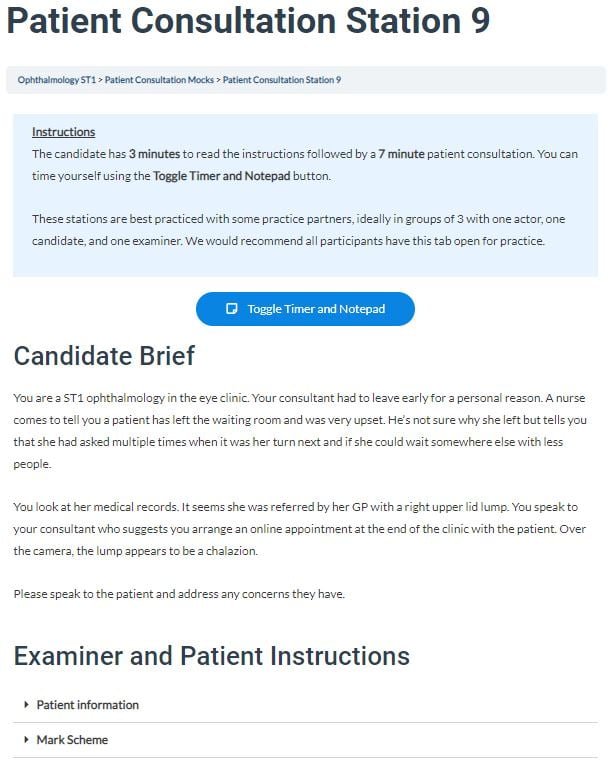Details about the 2022 OST1 recruitment process are now available on https://www.rcophth.ac.uk/training/national-recruitment-ophthalmic-specialist-training/ and the Severn Deanery recruitment page https://severndeanery.nhs.uk/recruitment/vacancies/show/oph-st1-2022.
This year’s deadlines are:
| 4 November 21 | Applications open |
| 1 December 21 | Applications close |
| 21 December 21 | Invitation to book MSRA |
| 6-15 January 22 | MSRA |
| 3-14 February 22 | Document upload for Evidence Folder |
| 11 March 22 | Online Interview dates |
Your total ranking score will be based on how well you score on these three elements:
| MSRA | Maximum score 20 points |
| Evidence Folder | Maximum score 50 points |
| Online Interview | Maximum score 30 points |
The Online Interviews make up a good chunk of your total score and will be held via MS Teams and candidates will not need to attend in person. The assessment will be in the form of a patient consultation and will involve conversing with an actor. The interview will be up to 10 minutes in length. According to Severn Deanery, The areas of competencies that you will need to showcase during the interview to meet the person specification are:
- Clinical Knowledge & Expertise
- Academic Skills (including research and audit skills as well as teaching)
- Personal Skills (including communication skills, problem solving and decision making, empathy and sensitivity, managing others and team involvement, organisation and planning, coping with pressure and managing uncertainty, understanding and applying the values of the NHS)
- Professional Integrity
- Commitment to Specialty
In reality, however, not all these skills are equally tested. For example, If you listen to our blog post summarising the 2021 interview podcast, you’ll hear that academic skills and commitment to the specialty are “tested” through your portfolio review. The focus is on the components of these that can’t directly come through your portfolio – these are mainly personal skills, professional integrity, and some clinical knowledge and expertise.
So what can you do now to practice showcasing your competencies ahead of the interviews? Here are some top tips for brushing up on your communication and clinical skills, based on our collective interview experience in the past years:
Communication Skills
The 2022 Online Interviews will likely be conducted around communication or patient consultation station, with some clinical knowledge being tested as part of the interaction. But the patient consultation station in past years has been one of the most challenging to master. No matter if you are faced with an angry patient, have to break bad news, explain a diagnosis (or lack thereof!), or manage systemic comorbidities — you will be expected to showcase:
- Rapport and listening
- Empathy
- Confidence in explaining what happened and what is likely to happen next
How can you ensure that you can get these three skills across in the interview? Here are some
Communication Quick Tips:
- Practice, practice, practice – Again as above, you can get better by practicing. This is one station where you really reap the benefits of practicing with different people as you will not only get fresh feedback on your approach, but also pick up nice ways different people have learnt to put things.
- Watch how other people do it – Candidates using stinterview.com have access to a network of other people practicing, failing that, Youtube has some amazing videos of GP’s sitting communication-heavy stations – watch these to get into the right frame of mind – we stole quite a few good lines from various candidates on youtube.
- Practice with someone you don’t know – Because that is what you will get in the interview. We offer up to 6 virtual mock interview workshops on stinterview.com this year, so you’ll get plenty of opportunities for practicing with new interview partners.
- Have a partner prepare cases you haven’t seen – To see how you respond when you are caught off guard
- Record yourself – One benefit of the Zoom era is you can record your own stations, watch yourself and make notes on how you would have handled or phrased things differently.
- Learn to explain things in simple terms – Avoid jargon at all costs, and learn to explain all the common ophthalmic conditions in plain English. Our markschemes, where appropriate, will give suggested phrases for each scenario.
- Focus on the basics – Keeping things simple in terms of your management plan, on the follow up plan
When we prepared for our interviews, we made up stations with each other and reached out to find practice partners. Not everyone has that privilege, and stinterview.com aims at both providing a wide base set of questions to get practicing straight away, and a network to find people to practice with. We’ve done this for you in our question bank:

Clinical Knowledge & Expertise
Use a question bank or knowledge tutor to brush up on your clinical knowledge. For example, our knowledge tutor includes core and additional knowledge for conditions commonly covered in the OST interviews in the form of an MCQ quiz.

Previous years have tested discrete clinical knowledge in the form of five question stems – based around a clinical image. Examiners asked very closed questions around each picture shown (for example, this is a snapshot from our question bank – the question is “what is seen here and what is the diagnosis?”). In the 2021 Online Interviews, clinical skills were tested as part of a communication station rather than using a clinical image. However, it can be an effective way of learning when you practice clinical expertise like this. So we are making Clinical Questions available as part of our offering on stinterview.com.

Clinical Knowledge Quick Tips:
- Make sure to know your basics well.
- Focusing on the high-yield conditions – Because only 1 condition will be tested, we can hypothesize it is unlikely to be a complex, neurofibromatosis or ectopic lens…! It would more likely be something more common like glaucoma, cataracts, or AMD.
- Don’t focus only on learning facts, make sure instead that you can articulate that knowledge in simple terms. Make sure you can explain facts in plain English (as if to a patient!).
- Systemic associations – Be mindful of systemic associations such as:
- Uveitis with ankylosing spondylitis or inflammatory bowel disease
- Retinal vascular problems – with associated systemic risk factors
- Thyroid eye disease – with antibodies, treatments
- Focus on things that a competent F2 should not miss – for example a third nerve palsy, a swollen optic disc, or an RAPD. Last year it was a Herpes Zoster Ophthalmicus – and whilst you didn’t need in depth knowledge nor did you have to make a diagnosis, it helped to know a bit about the condition, and general management.
You can practice your clinical and communication skills using one of our mock interview stations – alone, with a friend or with another OST candidate at one of our mock interview workshops. We release 2 new stations before each mock interview workshop, so watch this space and keep practicing!
Sign up now for your 6 month pass to the Ophthalmology ST1 course and get access to:
- 15 patient consultation mock stations– based on the new 2022 format, with mark schemes and full actor briefs
- 45 Mock clinical stations with answer schemes to help you build your background clinical knowledge
- A high-yield clinical knowledge tutor
- 5 mock-interview workshops between October and the interview date

